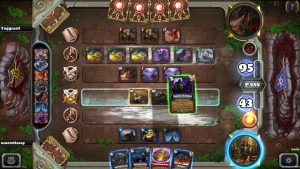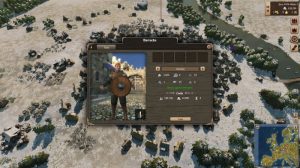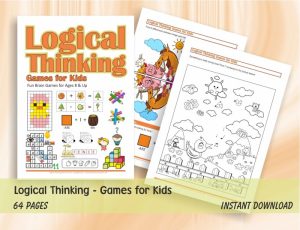
The world of strategy games has been revolutionized by the integration of card mechanics, adding a layer of unpredictability and depth to the gameplay. From simple resource management to intricate deck-building, cards have become an integral part of many popular titles, captivating players with their strategic potential and unique gameplay dynamics.
This article explores the evolution of card mechanics in strategy games, examining their diverse applications, impact on gameplay, and the future of this exciting fusion of tactics and chance. We’ll delve into the history of card mechanics, analyze their various types, and discuss their influence on strategic decision-making, resource management, and player interaction.
Design Considerations for Card Mechanics in Strategy Games

Card mechanics can add a layer of depth and unpredictability to strategy games, offering players a unique blend of strategic decision-making and tactical flexibility. When implemented effectively, they can significantly enhance the gameplay experience, leading to increased replayability and player engagement.
Creating a Balanced Card Pool
A balanced card pool is crucial for a fair and engaging gameplay experience. A diverse card pool with varying strengths and weaknesses provides players with a wide range of strategic options, allowing them to adapt to different situations and playstyles.
- Cost and Rarity: Cards should have varying costs and rarities, ensuring that powerful cards are not easily accessible and that players must make strategic decisions about resource allocation.
- Card Types and Effects: The card pool should include a variety of card types and effects, offering players a wide range of options to choose from. This can include cards that provide offensive, defensive, or utility-based benefits.
- Synergies and Counterplay: The card pool should be designed with synergies and counterplay in mind, creating a dynamic and engaging gameplay loop. This ensures that players must consider the effects of their card choices on their opponents’ strategies.
Designing Engaging Card Mechanics
Card mechanics should be designed to encourage player interaction, strategic decision-making, and emergent gameplay. They should also be easy to understand and learn, while still offering a depth of strategic possibilities.
- Resource Management: Card mechanics should involve resource management, forcing players to make strategic decisions about how to allocate their resources. This can include factors such as mana, energy, or other game-specific resources.
- Card Combinations: Card mechanics should allow for creative card combinations and synergies, encouraging players to experiment with different strategies. This can include cards that have unique effects when played in conjunction with other cards.
- Player Interaction: Card mechanics should promote player interaction, allowing players to directly influence each other’s strategies. This can include cards that have effects that directly target opponents, or that provide benefits to allies.
Ensuring Complexity and Depth
Card mechanics can add complexity and depth to strategy games, providing players with a more engaging and challenging experience. However, it is important to strike a balance between complexity and accessibility, ensuring that the game is enjoyable for both experienced and casual players.
- Learning Curve: The card mechanics should have a gradual learning curve, allowing players to gradually understand and master the game’s systems. This can be achieved by introducing new mechanics incrementally, and by providing clear and concise tutorials.
- Strategic Depth: The card mechanics should offer a significant amount of strategic depth, providing players with a variety of options and choices to make. This can include factors such as card drafting, deckbuilding, or strategic card play.
- Replayability: Card mechanics should contribute to the game’s replayability, ensuring that players can experience different outcomes and strategies each time they play. This can be achieved by incorporating elements such as randomized card draws, variable game setups, or dynamic gameplay elements.
Future Trends in Card Mechanics for Strategy Games
The integration of card mechanics in strategy games has become increasingly sophisticated, pushing the boundaries of gameplay and player engagement. This evolution is driven by innovative design approaches and the emergence of new technologies. Looking ahead, the future of card mechanics in strategy games promises even more dynamic and immersive experiences.
Integration with Emerging Technologies
Emerging technologies are poised to revolutionize the integration of card mechanics in strategy games. The advent of augmented reality (AR) and virtual reality (VR) presents exciting opportunities for enhancing the card-based gameplay experience.
- AR and VR Integration: AR and VR can transform the way players interact with cards. Imagine a strategy game where players physically manipulate cards in a virtual environment, using hand gestures to cast spells or deploy units. AR overlays could project card information onto the real world, creating a more immersive and interactive experience.
- AI-Powered Card Generation: Artificial intelligence (AI) can be used to generate dynamic and adaptive card decks. AI algorithms could analyze player behavior and game state to create decks tailored to individual players’ strategies and preferences. This could lead to more diverse and challenging gameplay experiences.
- Blockchain Technology: Blockchain technology offers a secure and transparent platform for managing card ownership and transactions. This could pave the way for decentralized card economies, where players can trade, collect, and even create their own unique cards. Blockchain-based card games could foster a sense of community and ownership among players.
Examples of Online Games with Card Mechanics

Card mechanics have become increasingly popular in online games, adding a layer of strategic depth and unpredictability to gameplay. These mechanics can be found in various genres, from strategy and role-playing games to collectible card games and even battle royale titles.
Online Games with Card Mechanics
The following table showcases popular online games that feature card mechanics:| Game | Genre | Platform | Card Mechanics Description ||—|—|—|—|| Gwent: The Witcher Card Game | Collectible Card Game | PC, Mobile | Gwent is a turn-based card game where players build decks and battle opponents using various cards representing characters, abilities, and locations from the Witcher universe. Players must strategically manage their resources, play cards to gain advantage, and outsmart their opponents.
|| Hearthstone | Collectible Card Game | PC, Mobile | Hearthstone is a popular card game that features a variety of classes, each with unique cards and abilities. Players build decks and battle against opponents in turn-based matches, utilizing card synergies and strategic decision-making. || Legends of Runeterra | Collectible Card Game | PC, Mobile | Legends of Runeterra is a card game set in the League of Legends universe.
Players build decks using champions and spells from various regions, and engage in turn-based battles, employing strategies and tactics to outmaneuver their opponents. || Magic: The Gathering Arena | Collectible Card Game | PC, Mobile | Magic: The Gathering Arena is a digital version of the popular tabletop card game, featuring a vast collection of cards and game modes. Players build decks, draft new cards, and battle against opponents in turn-based matches, utilizing card synergies and strategic decision-making.
|| Artifact | Collectible Card Game | PC | Artifact is a card game set in the Dota 2 universe. Players control three heroes and battle against opponents in three lanes, utilizing card synergies and strategic decision-making to gain advantage. || The Elder Scrolls: Legends | Collectible Card Game | PC, Mobile | The Elder Scrolls: Legends is a card game set in the Elder Scrolls universe.
Players build decks using various cards representing characters, abilities, and locations, and engage in turn-based battles, utilizing card synergies and strategic decision-making. || Eternal | Collectible Card Game | PC, Mobile | Eternal is a card game that features a unique card design system and a vast collection of cards. Players build decks and battle against opponents in turn-based matches, utilizing card synergies and strategic decision-making.
|| Faeria | Strategy Card Game | PC, Mobile | Faeria is a unique strategy card game that combines card mechanics with board game elements. Players build decks and battle against opponents on a board, utilizing card synergies and strategic decision-making to control territories and gain advantage. || Slay the Spire | Roguelike Deckbuilding | PC, Mobile | Slay the Spire is a roguelike deckbuilding game where players build decks and battle against enemies, utilizing card synergies and strategic decision-making to survive and reach the top of the spire.
|| Monster Train | Roguelike Deckbuilding | PC, Mobile | Monster Train is a roguelike deckbuilding game where players build decks and battle against enemies on a train, utilizing card synergies and strategic decision-making to survive and reach the destination. || Card Crawl | Roguelike Deckbuilding | Mobile | Card Crawl is a roguelike deckbuilding game where players battle against monsters in a dungeon, utilizing card synergies and strategic decision-making to survive and defeat the boss.
|| Card Hunter | Turn-based RPG | PC | Card Hunter is a turn-based RPG where players build decks and battle against enemies, utilizing card synergies and strategic decision-making to progress through the game. || Ascension: Deckbuilding Game | Deckbuilding | PC, Mobile | Ascension is a deckbuilding game where players build decks and battle against enemies, utilizing card synergies and strategic decision-making to gain victory points.
|| Dominion | Deckbuilding | PC, Mobile | Dominion is a deckbuilding game where players build decks and purchase cards to gain victory points. || Star Realms | Deckbuilding | PC, Mobile | Star Realms is a deckbuilding game where players build decks and battle against enemies, utilizing card synergies and strategic decision-making to conquer the galaxy. || Night of the Full Moon | Deckbuilding | PC, Mobile | Night of the Full Moon is a deckbuilding game where players build decks and battle against enemies, utilizing card synergies and strategic decision-making to defeat the werewolf.
|| Thunderstone Quest | Deckbuilding | PC, Mobile | Thunderstone Quest is a deckbuilding game where players build decks and battle against monsters, utilizing card synergies and strategic decision-making to defeat the dungeon boss. || Solforge | Collectible Card Game | PC | Solforge is a card game that features a unique card design system and a vast collection of cards.
Players build decks and battle against opponents in turn-based matches, utilizing card synergies and strategic decision-making. || Shadowverse | Collectible Card Game | PC, Mobile | Shadowverse is a card game that features a variety of classes, each with unique cards and abilities. Players build decks and battle against opponents in turn-based matches, utilizing card synergies and strategic decision-making.
|| Duelyst | Collectible Card Game | PC, Mobile | Duelyst is a card game that combines card mechanics with board game elements. Players build decks and battle against opponents on a board, utilizing card synergies and strategic decision-making to control territories and gain advantage. || Hand of Fate 2 | Action RPG | PC, Mobile | Hand of Fate 2 is an action RPG where players build decks and battle against enemies, utilizing card synergies and strategic decision-making to progress through the game.
|| The Banner Saga | RPG | PC, Mobile | The Banner Saga is an RPG where players build decks and battle against enemies, utilizing card synergies and strategic decision-making to progress through the game. || Cardfight!! Vanguard | Collectible Card Game | PC, Mobile | Cardfight!! Vanguard is a card game where players build decks and battle against opponents in turn-based matches, utilizing card synergies and strategic decision-making.
|| Yu-Gi-Oh! Duel Links | Collectible Card Game | Mobile | Yu-Gi-Oh! Duel Links is a card game based on the popular anime and manga series. Players build decks and battle against opponents in turn-based matches, utilizing card synergies and strategic decision-making. || Clash Royale | Strategy | Mobile | Clash Royale is a strategy game that combines card mechanics with tower defense elements.
Players build decks and battle against opponents, utilizing card synergies and strategic decision-making to destroy their opponent’s towers. || Brawl Stars | Battle Royale | Mobile | Brawl Stars is a battle royale game that features a variety of brawlers, each with unique abilities and cards. Players build decks and battle against opponents, utilizing card synergies and strategic decision-making to defeat their opponents.
|Card mechanics in online games add a layer of complexity and depth to gameplay, offering players a diverse range of strategies and choices. From collectible card games to strategy and battle royale titles, card mechanics have become an integral part of the online gaming landscape.
Examples of Educational Games with Card Mechanics
Card mechanics, often used in strategy games, have proven to be valuable tools for engaging and educating players of all ages. These mechanics introduce elements of chance, strategy, and decision-making, creating a dynamic learning experience. Educational games that leverage card mechanics can effectively reinforce concepts, enhance problem-solving skills, and foster a deeper understanding of various subjects.
Examples of Educational Games with Card Mechanics
Educational games with card mechanics provide an interactive and engaging way to learn various subjects. Here are a few examples:
| Game Name | Subject Matter | Platform | Card Mechanics |
|---|---|---|---|
| Sushi Go! Party | Math, Strategy, Pattern Recognition | Desktop, Mobile | Players collect sets of cards with different sushi types, scoring points based on the number and combinations of sushi they have. |
| Set: The Game | Logic, Visual Perception, Critical Thinking | Desktop, Mobile | Players identify sets of three cards that share a common feature or have all different features. The game challenges players to think strategically and quickly identify patterns. |
| Kingdomino | Spatial Reasoning, Resource Management, Strategy | Desktop, Mobile | Players draft domino-like tiles with different terrain types to build their kingdom. Each tile offers different resources and scoring opportunities, encouraging strategic planning and resource management. |
| SpellTower | Vocabulary, Spelling, Word Recognition | Mobile | Players create words by connecting adjacent letters on a grid, similar to a crossword puzzle. Each letter has a point value, and players compete for the highest score. |
The card mechanics in these games serve multiple educational purposes:* Enhancing engagement: Card games often feature visual elements and interactive gameplay, making learning more enjoyable and less intimidating.
Promoting critical thinking
Players need to analyze the cards, consider potential outcomes, and make strategic decisions, fostering critical thinking skills.
Reinforcing concepts
Games like Sushi Go! Party and Kingdomino reinforce mathematical concepts, resource management, and spatial reasoning through gameplay.
Developing problem-solving skills
Games like Set: The Game and SpellTower encourage players to think creatively and find solutions to challenges, improving their problem-solving abilities.
Examples of Sports Games with Card Mechanics
Card mechanics have found their way into a variety of sports games, adding a layer of strategic depth and player customization that goes beyond traditional gameplay. These games leverage cards to represent various aspects of the sport, such as player abilities, team formations, or even specific moves and tactics.
Examples of Sports Games with Card Mechanics
The integration of card mechanics in sports games allows for a diverse range of strategic options, empowering players to make crucial decisions that impact the outcome of matches. Here are some notable examples of sports games that incorporate card mechanics:
| Game | Sport | Platform | Card Mechanics |
|---|---|---|---|
| NBA 2K Mobile | Basketball | Android, iOS | Players collect cards representing real-life NBA players, each with unique abilities and stats. These cards are used to build a team and compete in various game modes. |
| FIFA Mobile | Soccer | Android, iOS | Similar to NBA 2K Mobile, FIFA Mobile utilizes cards to represent players, each with specific attributes and skills. Players can collect and upgrade cards to build a strong team and compete in leagues and tournaments. |
| MLB Tap Sports Baseball | Baseball | Android, iOS | MLB Tap Sports Baseball features card mechanics for both players and managers. Players can collect cards representing real-life MLB players, while managers can collect cards that provide tactical advantages and bonuses. |
| Top Eleven – Be a Football Manager | Soccer | Android, iOS | Top Eleven incorporates card mechanics for player training and development. Players can collect and use cards to enhance their players’ abilities and improve their overall performance. |
The integration of card mechanics has enriched the world of strategy games, adding an element of surprise, depth, and strategic complexity. As technology advances and player preferences evolve, we can expect to see even more innovative and engaging ways to incorporate cards into future strategy games. From deck-building to resource management, card mechanics have become a vital part of the gaming landscape, offering players a unique and captivating experience that combines skill, strategy, and a touch of chance.
Clarifying Questions
What are some popular strategy games that incorporate card mechanics?
Some popular examples include Hearthstone, Magic: The Gathering Arena, Gwent, Slay the Spire, and Legends of Runeterra. These games offer a diverse range of card mechanics, gameplay styles, and strategic challenges.
How do card mechanics influence strategic decision-making in strategy games?
Card mechanics introduce a layer of unpredictability and strategic complexity. Players must adapt their strategies based on the cards they draw, making choices that maximize their advantage while considering the potential actions of their opponents.
What are the benefits of incorporating card mechanics into strategy games?
Card mechanics enhance strategic depth, provide a sense of emergent gameplay, and offer a diverse range of strategic options for players. They also create opportunities for player interaction and strategic decision-making.
What are some future trends in card mechanics for strategy games?
Future trends may include the use of augmented reality, virtual reality, and artificial intelligence to enhance card mechanics, creating more immersive and interactive experiences.



